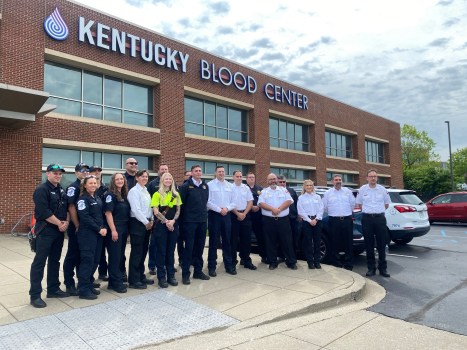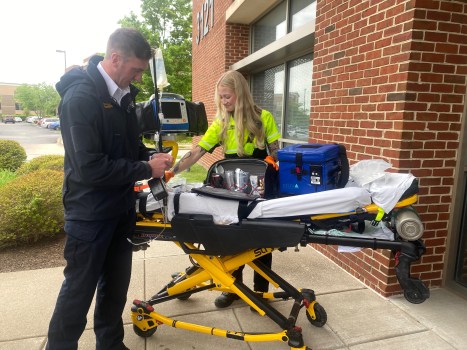Jessamine County EMS to administer blood prehospital thanks to Kentucky Blood Center partnership
Published 1:17 pm Thursday, May 8, 2025
|
Getting your Trinity Audio player ready...
|
In a media event held at the Kentucky Blood Center in Lexington on Wednesday, May 7, University of Kentucky and Kentucky Blood Center (KBC) directors announced a partnership between the KBC and Georgetown/Scott County Emergency Medical Services (EMS), Jessamine County EMS, Lexington Fire and Emergency Services and Madison County EMS.
Trauma is the leading cause of death for patients under the age of 45, according to the American College of Surgeons. As summer quickly approaches, so does the trauma season. When trauma strikes, every second counts.
On June 2, 2025, these four EMS groups will begin carrying lifesaving whole blood to administer to trauma patients before they arrive at the hospital. According to Jessamine County EMS, giving whole blood to patients before arriving at the hospital can improve survival by up to 20 percent. Whole blood is complete, unprocessed blood containing all its components, including red blood cells, white blood cells, platelets, and plasma.
According to Jessamine EMS Assistant Chief Floyd Miracle, a study in New Orleans found that for every minute a trauma patient goes without receiving blood, that person’s risk of dying increases by 11 percent.
“As the sole provider of blood to hospitals in Fayette, Jessamine, Madison, and Scott counties, Kentucky Blood Center takes its responsibility to provide lifesaving blood products very seriously,” said Dr. Dennis Williams, Kentucky Blood Center’s medical director. “Partnering with these local EMS groups to enhance patient outcomes is a win-win for everyone.”
“We definitely think it’s going to be very impactful, and if I’m in the street or my home bleeding out, and a supervisor that shows up can give me blood or just the fluids we carry now, I’m gonna say blood all day long,” Miracle said. Until now, the EMS teams in this partnership have only carried normal saline or Lactated Ringer’s, which replace bodily fluids but do not make up for blood loss.
Judge-Executive David West said Floyd has been at the forefront of EMS providers working to bring whole blood onto EMS vehicles. “He’s worked with the Blood Center and Physicians. He’s been an absolute bulldog on pushing this forward. He has just kept pushing because this will save lives,” West said.
“Jessamine County EMS prides itself on being progressive and bringing the care to the patient that we think is going to be helpful. We see a benefit with being able to administer blood in the field, whether that’s in the streets or the patient’s home, we want to get lifesaving care to them,” Miracle said.
A few years ago, Miracle and Jessamine County EMS discussed with UK Healthcare Trauma Medical Director Dr. Andrew Bernard and Kentucky Blood Center Officials. “We said we would like to start giving blood to patients in the field, and being the first EMS agency to approach the KBC, they asked, ‘How is this going to work?’ So over the course of two years, many meetings, developing a relationship and a partnership, we’re here,” Floyd said, adding that less than one percent of ground EMS agencies are administering blood. Although some of this one percent have been administering blood for over a decade, it’s new in Kentucky. “It took a while to build those relationships and earn their trust to be able to start carrying the blood.”
Louisville Metro announced its partnership with the American Red Cross to administer blood at the beginning of April. Miracle said this is very meaningful, and that developing the kind of partnership central Kentucky EMS teams have with UK and the KBC takes time. “We have a really wonderful relationship with UK and the Kentucky Blood Center now.”
Miracle said the work to improve care is “never done, but the big part, the hard part of putting together the policies, protocol, training, and coordination, is a pretty big release. It takes a lot to build this program, and now we’re going to continuously maintain it for years to come. I’m excited that we were just lucky enough to be a part of the initial group to do it in our area. I foresee many other EMS agencies in Kentucky reaching out wanting to do the same thing, and we’ll provide that support if needed.”
Each EMS vehicle in Jessamine County will begin carrying one unit of whole blood on each vehicle. All paramedics at Jessamine EMS can administer blood, and the eight supervisors on the team have been trained to monitor the blood’s storage to ensure it stays at the right temperature and is cycled out to be used at the trauma center before the blood expires.
Jessamine EMS Chief Jamie Goodpastor said the agency responded to 10,000-11,000 this past year, not including the number of vehicles and teams responding to each call.
“My first thought is just pride. Not only are we serving people by providing this Whole blood that will save lives, but I’m also proud that Jessamine County has led this charge,” West said.
Officials with the Kentucky Blood Center said they need blood donors as trauma season approaches. All blood types are needed, but because O-negative blood is universal, it is especially important for individuals with that blood type to donate.
To donate, you must be in good health, weigh at least 110 pounds, have a photo ID, and be at least 17 years old. If you’re 16 years old, you can donate with a signed parent permission slip that can be found at kybloodcenter.org. Schedule your donation at kybloodcenter.org.
Goodpastor said that when you donate your blood, you’ll receive a text message saying your blood was used, and it may even tell you where it was administered.
“Without having a community that supports EMS, this absolutely is not possible. So I just want to thank the community members, and I want to encourage everyone to go out and donate. The blood you donate could be the blood that we carry and give to you, family members, and friends,” Miracle said.







